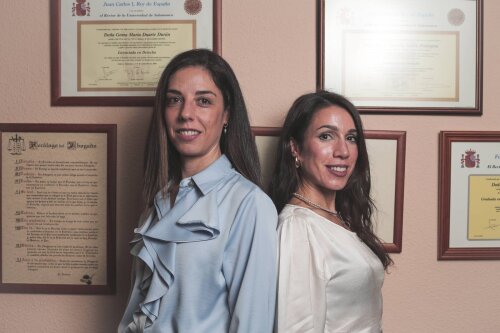Best Water Law Lawyers in Madrid
Share your needs with us, get contacted by law firms.
Free. Takes 2 min.
List of the best lawyers in Madrid, Spain
About Water Law in Madrid, Spain
Water law in Madrid, Spain is a specialized legal field dealing with the regulation, usage, and management of water resources. It governs how individuals, companies, and public bodies may extract, use, share, and protect water in the region. The legal framework covers surface water, groundwater, and related environmental considerations. Water law in Madrid not only addresses property rights and usage, but also focuses on sustainable management, environmental protection, pollution control, and public participation in water policies. Spanish national law, European directives, and regional policies in the Comunidad de Madrid together shape the rules affecting water rights, distribution, and dispute resolution.
Why You May Need a Lawyer
Legal help in the field of water law can be essential for a variety of situations. Common scenarios include:
- Disputes over water usage between neighbors, businesses, or communities
- Permitting and compliance with regulations for wells, irrigation systems, or industrial water use
- Issues related to water contamination and environmental liability
- Changes in water rights, ownership transfers, or infrastructure development
- Problems involving drought, water restrictions, or emergency measures
- Public participation or legal challenges regarding municipal or regional water projects
- Administrative actions by water authorities or fines for alleged violations
A lawyer specializing in water law can provide guidance on legal requirements, representation in negotiations or court procedures, and help clients navigate the complex web of overlapping regulations at municipal, regional, and national levels.
Local Laws Overview
Water management in Madrid is shaped by a combination of national and regional laws. The main national law is the Ley de Aguas (Water Law), which is complemented by the regulations set by the Confederación Hidrográfica del Tajo, the river basin authority overseeing most of the region. The Comunidad de Madrid also issues specific regulations to address local water distribution, sanitation, and sustainable development goals.
Key aspects include:
- Permitting: Most water extraction, diversion, or construction (such as wells or reservoirs) require prior authorization.
- Water Rights: Rights to water use are distinct from land ownership and are typically subject to registration and periodic review.
- Environmental Protection: There are strict rules on discharges, pollution prevention, and the protection of aquatic ecosystems.
- Public Participation: Stakeholders have the right to participate in certain planning processes, and decisions can be challenged in administrative courts.
- Sanctions: Violations can lead to fines, mandatory restoration, and in some cases, criminal liability.
- Integration of EU Law: Madrid follows European directives, such as the Water Framework Directive, which sets standards for water quality and resource management.
Frequently Asked Questions
What is a water right in Madrid, and how is it obtained?
A water right is the legal permission to use a specific amount of water for a particular purpose. In Madrid, water rights are not automatically granted with land ownership. Individuals or entities must apply to the relevant river basin authority for a concession or permit.
Can I drill a private well on my property?
Drilling a well typically requires a permit from the regional water authority, even for private use. Unauthorized drilling can result in significant penalties.
Who regulates water distribution and quality in Madrid?
The Confederación Hidrográfica del Tajo oversees regional water resources, while local distribution and quality are often managed by Canal de Isabel II, the main public water company in Madrid.
What should I do if my water is contaminated?
Contact the local water utility or environmental authorities immediately. Depending on the severity, legal action may be necessary, especially if the contamination leads to health hazards or damages.
Are there restrictions on water use during drought?
Yes, the authorities can impose restrictions on irrigation, filling pools, or other non-essential water uses to manage shortages and protect supplies.
How do I challenge a penalty or decision by a water authority?
Penalties or adverse decisions can usually be appealed through administrative channels first, followed by an appeal before the courts if necessary. Legal guidance is recommended for these processes.
Can water rights be transferred or sold?
Transferring or selling water rights is possible but requires authorization from the river basin authority and compliance with legal requirements.
Do environmental laws affect water use?
Yes, strict environmental regulations control discharges, pollution, and protect habitats. Failure to comply can result in heavy fines and restoration orders.
What role do municipalities play in water management?
Municipalities often manage local water distribution, sanitation, and minor infrastructure. They also enforce some regional regulations and may be involved in development planning.
Where can I find more information on water law or get help?
You can consult public agencies, legal professionals specializing in water law, or dedicated organizations and authorities for more information and guidance.
Additional Resources
If you need more information or assistance regarding water law in Madrid, consider reaching out to:
- Confederación Hidrográfica del Tajo: The main river basin management authority responsible for water rights and regulation in Madrid.
- Canal de Isabel II: The public company overseeing water supply, quality, and distribution in Madrid.
- Comunidad de Madrid Department of Environment and Urban Planning: Handles regional water policy and enforcement.
- Municipal Water Departments: Address local water management and related concerns.
- Collegiate Bar Associations (Colegio de Abogados): Can provide references to lawyers experienced in water law.
- Environmental NGOs and research organizations focused on water resource protection and policy.
Next Steps
If you believe you need legal assistance related to water law in Madrid:
- Identify the specific issue you are facing, such as disputes, permits, contamination, or penalties.
- Collect all relevant documentation, including permits, letters, test results, or any notifications from authorities.
- Contact a lawyer who specializes in water law. You can start with a local bar association or by requesting referrals from organizations mentioned above.
- Prepare a summary of your case to discuss during your first consultation. Be clear about your objectives and any deadlines you face.
- Ask about your legal options, possible costs, and timelines for resolving your case.
Navigating water law requires specialized knowledge due to complex regulations and frequent updates. Consulting with a legal professional early can help protect your rights and ensure compliance with all applicable laws in Madrid, Spain.
Lawzana helps you find the best lawyers and law firms in Madrid through a curated and pre-screened list of qualified legal professionals. Our platform offers rankings and detailed profiles of attorneys and law firms, allowing you to compare based on practice areas, including Water Law, experience, and client feedback.
Each profile includes a description of the firm's areas of practice, client reviews, team members and partners, year of establishment, spoken languages, office locations, contact information, social media presence, and any published articles or resources. Most firms on our platform speak English and are experienced in both local and international legal matters.
Get a quote from top-rated law firms in Madrid, Spain — quickly, securely, and without unnecessary hassle.
Disclaimer:
The information provided on this page is for general informational purposes only and does not constitute legal advice. While we strive to ensure the accuracy and relevance of the content, legal information may change over time, and interpretations of the law can vary. You should always consult with a qualified legal professional for advice specific to your situation.
We disclaim all liability for actions taken or not taken based on the content of this page. If you believe any information is incorrect or outdated, please contact us, and we will review and update it where appropriate.















